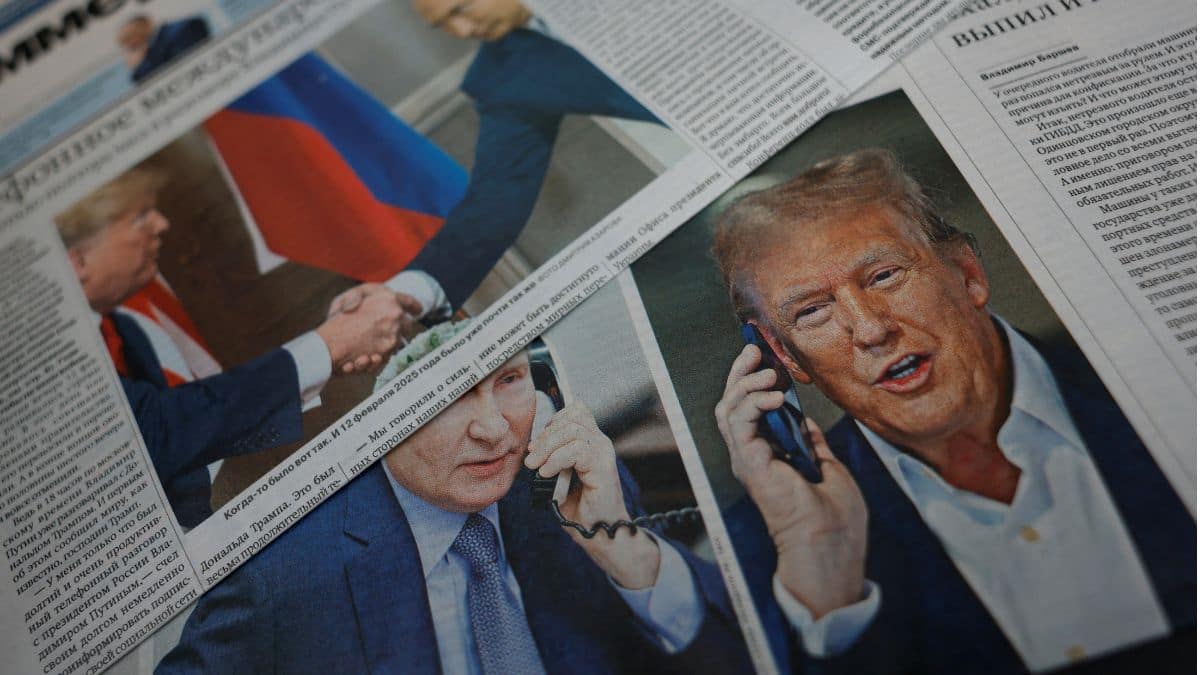Politics
New Nuclear Tensions Emerge as Trump and Putin Clash

The much-anticipated meeting between US President Donald Trump and Russian President Vladimir Putin in Budapest, Hungary, has been abruptly cancelled following the announcement of new sanctions against Russia’s largest oil companies, Rosneft and Lukoil. On October 22, 2023, President Trump confirmed the cancellation, marking a significant setback in diplomatic engagements between the two nations.
In the aftermath of the cancellation, Hungarian Minister of Foreign Affairs and Trade Peter Szijjarto met with US Secretary of State Marco Rubio in Washington. Szijjarto expressed optimism through social media, stating that the US had not abandoned hopes for the Budapest Peace Summit. Meanwhile, Kirill Dmitriev, a special presidential representative from Russia, indicated that negotiations among Ukraine, Russia, and the United States were progressing. He highlighted a shift in Ukraine’s stance, noting that President Volodymyr Zelenskyy suggested that freezing the conflict along current frontlines could be a viable compromise.
Despite these diplomatic overtures, Dmitry Peskov, the Kremlin spokesman, downplayed the meeting’s cancellation, emphasizing the need for further preparations and acknowledging that the sanctions had negatively impacted the potential for improved relations.
Nuclear Tests and Military Posturing
In a striking demonstration of military capability, Russia conducted nuclear-powered missile tests and large-scale drills around the same time. On October 22, a Yars intercontinental ballistic missile was successfully test-fired from the Plesetsk launch facility, while a Sineva ICBM was launched from a submarine in the Barents Sea. The Kremlin confirmed that strategic bomber forces also participated, with Tu-95 aircraft launching long-range cruise missiles.
On October 26, President Putin, in military attire, announced the successful test of the Burevestnik, a nuclear-powered missile described as a “unique product” with a range exceeding 8,000 miles. He also unveiled another weapon, the Poseidon, an unmanned underwater drone capable of evading interception. According to Putin, the Poseidon could significantly outperform the Sarmat missile, which was first introduced in 2018.
During this period, Ukraine launched an offensive against a Russian chemical plant using Storm Shadow missiles, targeting facilities involved in the production of military-grade materials. The escalation in military actions has added to the already tense atmosphere surrounding the diplomatic efforts.
The Changing Landscape of Nuclear Strategy
The introduction of the Burevestnik and Poseidon underscores significant advancements in Russia’s military technology. The Burevestnik, which has been under development for over two decades, was previously involved in a failed test in 2019 that resulted in a radiation release and the deaths of several nuclear scientists. Its purported unlimited range and capability to strike from unpredictable directions pose a potential challenge to existing missile defense systems.
General Valery Gerasimov, Russia’s military commander, claimed that the Burevestnik successfully traveled 8,700 miles during a recent test and could accurately target highly protected sites. The Poseidon, described as an autonomous nuclear-powered underwater vehicle, is designed to evade traditional defense mechanisms, presenting a formidable challenge to NATO and US military strategies.
Despite the provocative nature of these tests, both Russian and US officials have indicated a willingness to engage in dialogue. Peskov reiterated that Russia’s actions are driven by national interests, suggesting that the Kremlin views its military developments as necessary for maintaining strategic parity with the United States.
In the United States, President Trump responded to Russia’s military advancements by directing the Department of War to accelerate nuclear weapons testing. If implemented, this directive would mark the first US nuclear detonation since 1992, effectively ending a long-standing moratorium. Critics, including Daryl Kimball of the Arms Control Association, have denounced the plan as unnecessary and politically motivated, highlighting the complexities of reactivating nuclear tests.
The current geopolitical climate raises concerns about the potential for a renewed arms race. The expiration of the New Start Treaty in February 2024 looms, with little indication of forthcoming negotiations to extend or replace it. As all nine nuclear-armed nations, including China, continue to bolster their arsenals, analysts warn that the post-Cold War arms control framework is at risk of collapse.
The unfolding dynamics between the United States and Russia suggest a new era of nuclear competition, where both nations are compelled to reassess their strategic capabilities. With the potential for escalation remaining, the international community watches closely, aware that the consequences of miscalculation could have far-reaching implications for global security.
-

 World4 months ago
World4 months agoSBI Announces QIP Floor Price at ₹811.05 Per Share
-

 Lifestyle4 months ago
Lifestyle4 months agoCept Unveils ₹3.1 Crore Urban Mobility Plan for Sustainable Growth
-

 Science3 months ago
Science3 months agoNew Blood Group Discovered in South Indian Woman at Rotary Centre
-

 World4 months ago
World4 months agoTorrential Rains Cause Flash Flooding in New York and New Jersey
-

 Sports3 months ago
Sports3 months agoBroad Advocates for Bowling Change Ahead of Final Test Against India
-

 Top Stories4 months ago
Top Stories4 months agoKonkani Cultural Organisation to Host Pearl Jubilee in Abu Dhabi
-

 Science4 months ago
Science4 months agoNothing Headphone 1 Review: A Bold Contender in Audio Design
-

 Top Stories4 months ago
Top Stories4 months agoAir India Crash Investigation Highlights Boeing Fuel Switch Concerns
-

 Sports3 months ago
Sports3 months agoCristian Totti Retires at 19: Pressure of Fame Takes Toll
-

 Business4 months ago
Business4 months agoIndian Stock Market Rebounds: Sensex and Nifty Rise After Four-Day Decline
-

 Politics4 months ago
Politics4 months agoAbandoned Doberman Finds New Home After Journey to Prague
-

 Top Stories4 months ago
Top Stories4 months agoPatna Bank Manager Abhishek Varun Found Dead in Well









